- Life top
- Daily Life
- Applying for LINE stickers
- Exhibition of Matsumoto-sensei
- Hana - Shiba-Inu
- Elec. handicraft & Akihabara
- Supermarkets in the area
- Takaido Civic Center
- Building a house
- Horrible dentists
- Judo therapy
- In an elderly care home
- Parties
- Cosplay bonenkai 2010
- Gainax cosplay bonenkai
- Friends from Gainax
- Friends from schooldays
- Party at Bar Espion
- Home party with cheese
- Music Life
- TARO Quartet
- Maeda-san - violin maker
- Chigusa Kindergarten
- Seniors playing music
- My viola debut
- Torakyo regular concert
- Toranomon Orchestra
- Four seasons
- Shrine visit of the New Year
- New Year´s postcard
- Snowfall in Tokyo
- Hina-matsuri and hina-dolls
- Sakura - cherry-blossom
- Sakura - what I missed most
- Fireworks Festival
- People
- Itakura - his adventurous life
- Naoto - his country life
 ... its activities and COVID-19
... its activities and COVID-19
"TARO Quartet" is the name of our string ensemble, when we go to an elderly nursing home for giving concerts.
My mother, who was in a nursing home for the elderly, once said, "You say you're enjoying playing violin these days, but I have not heard you playing violin since you were grown up." I told her I would be happy to play for her, but added it would be difficult to play for her there, because she was in the nursing home and it was difficult to play an instrument without disturbing neighbors. I then proposed her for me to arrange a concert for the home residents, so that she could join them and listen to my performance. She agreed.
Playing violin alone is completely unsuitable for accompaniment of songs, but accompaniment of songs sung by the elderly is necessary for concerts in a nursing home. So, I asked friends who regularly play string quartets with me, for helping me in performing a concert at the nursing home. They all supported my idea. We agreed to hold a concert with a program comprising firstly of nostalgic songs which grandpas and grandmas could happily sing with the accompaniment of our string quartet, and secondly of a few numbers of light classical music played only by instruments. The secretariat of "Anshinkan Nursing Home (link to a Japanese site)", where my mother lived, responded to our proposal positively.
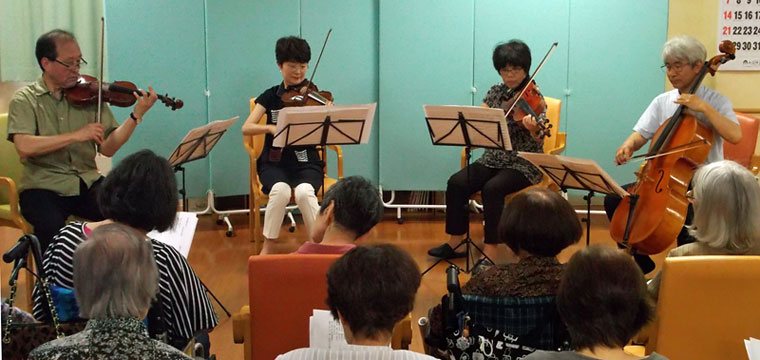
At the first concert on May 27 2017.
The first concert took place on May 27, 2017. Under the title of "Let's sing nostalgic postwar songs with the accompaniment of string quartet", we played eight popular songs and the first movement of Eine kleine Nachtmusik. About 40 to 50 elderly people participated and sang enthusiastically. Fortunately, the concert was favorably received and my mother became happy with the good reputation of her son! Since then, we were invited by Anshinkan for giving a concert regularly twice a year.
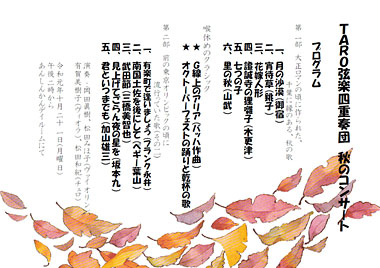
The second concert held in October that fall was a classic-music-only concert centered on Vivaldi's "La primavera", upon the request of the care staff. We also played a Mozart's divertimento, a beautiful slow movement of a Mendelssohn's quartet, and three slightly melancholic Waltz. While we were playing "Goin' Home" as an encore, we suddenly noticed that many grandmas were weeping. In Japan, this melody from the second movement of Dvorak's 9th symphony was and is still now played all over the country as music when schools end and school children go home. Grandmas vividly called up happy memories of good old days and could not help weeping. After this incident, "Goin' Home" became a repeatedly requested encore piece.
Goin' Home:TARO Quartet version
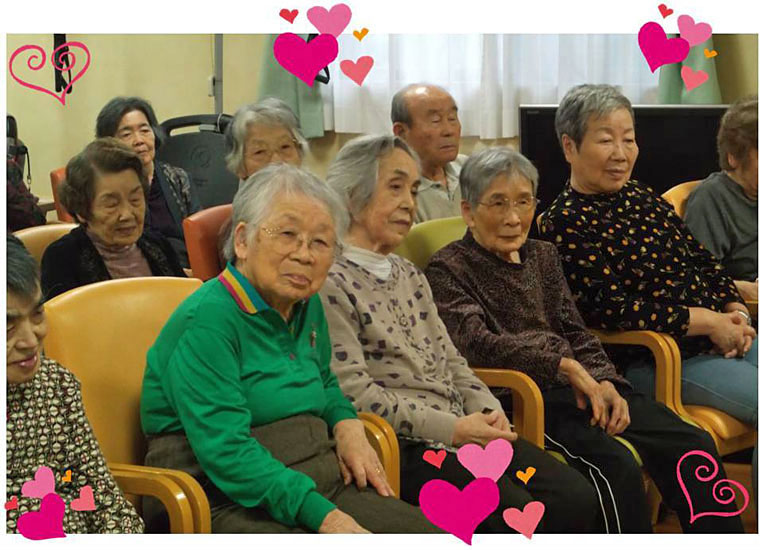
Below: Program for the concert above
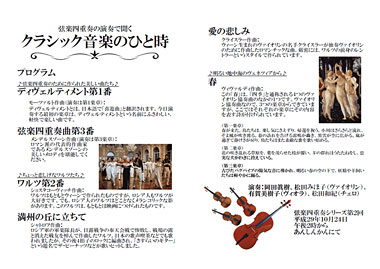
During the concert, a request came up that our quartet should have a name. I immediately suggested "TARO Quartet". “TARO” is a name traditionally given to the eldest son and means "the first boy". However, "TARO" of our quartet name comes from "tanosii rogo" meaning "pleasant old age". It is a very suitable name for a group, whose members themselves are already as old as the residents in the elderly nursing home and are happy to spend pleasant time together with them. Everyone was happy about this explanation and thereafter our quartet came to be called "TARO Quartet".
Gradually, TARO Quartet expanded its repertory, from popular songs to nursery songs and elementary school songs, because we noticed that the latter category songs were especially related to childhood and nostalgic memory. We tried to give each concert specific theme or character. For example, we built concert programs comprising of songs related to the season when the concert was held such as spring or autumn. Another time, we made programs concentrated on specific age such as post war period or the time around the Tokyo Olympic games in 1964. We once took up Japanese folk songs, and played for example "Yosakoi Soran Bushi" as accompaniment for the chorus and dance performed by residents and care staff.
Yosakoi Soran Bushi:TARO Quartet version
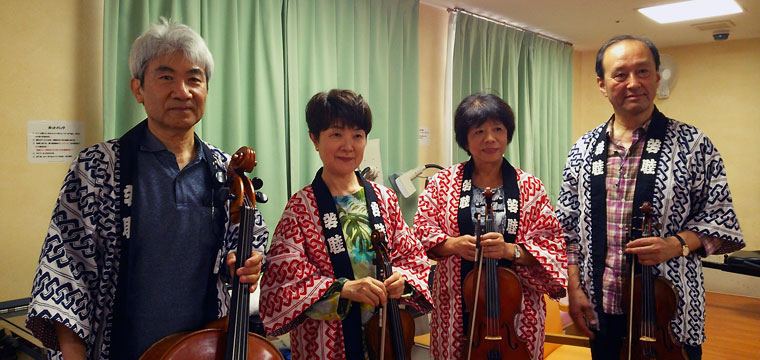
At the may concert in 2019, after the performanc of Yosakoi Soran Bushi. From left to right: Matsuda-kun, Mihoko-san, Miko-chan and me. Matsuda-kun is my high school classmate. We both were members of the students orchestra. Mihoko-san is his wife and one year junior to us at the same high school and its orchestra. I knew Mihoko-san already when I was a primary school schoolboy, as we both learned at the same violin school. Miko-chan is a member of Torakyo where I got to know her around 1990. You can see her elsewhere on this site.
We also thought of a bit comical way of performance. The MIDI linked to the violin on the top page of the "Culture" section is the first movement of a parody of Eine Kleine Nachtmusik. I used this parody music for a quiz to the participants and asked them to guess the titles of Japanese songs which were woven into. When I was a student in Germany, Martin, a German cellist of our quartet, had a parody score called "Eine kleine Lachmusik" using German songs and other music familiar to the German people. I tried to make a similar joke music using Japanese nursery and elementary school songs. By the way, it was very difficult to use Japanese popular songs and integrate them into the Mozart's music. I found that nursery and school songs have a higher affinity with Western classical music.
A little laugh music:TARO Quartet version
This Allegro includes seven Japanese songs.
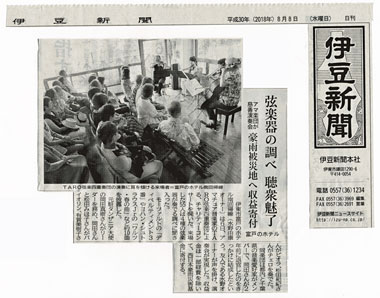
After performing several concerts at the nursing home, we wanted to give a concert for ordinary people as well, and I asked the owner of Minami-Kaikisen, whether he would arrange a concert in his hotel. Fortunately, Mizuno-san was willing to accept our request. So, on August 6, 2018, we held a concert of popular classical music in the hall of Minami-Kaikisen for the people who were generous to pay 1,000 yen for our concert. The concert was reported on the local news page of Izu Shimbun. We played only classical pieces, but we invited the people at the end of concert to sing "Hills of mandarin orange blossoms" together with our accompaniment. This song was composed with the scenery of Ito as a model. All 55 people (according to the report of Izu Shimbun) who attended the concert sang, to our surprise, up to the end of the song without seeing lyrics.
Hills of mandarin orange blossoms:TARO Quartet version
the last concert of TARO Quartet
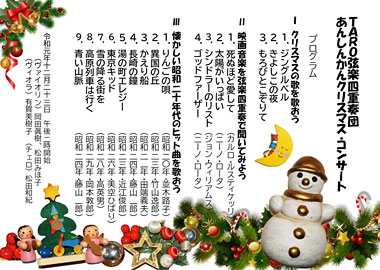
After that, TARO Quartet challenged, for example, music of movies and TV dramas, songs that were popular around the time of the last Olympics, nursery rhymes born in the Taisho era and so on, and held the first Christmas concert in December 2019. However, COVID-19 began affecting our life when we started preparing for the concert in May 2020. At the end of January 2020, contact with the residents of the nursing home was canceled and the planned concert was postponed indefinitely, in order to prevent infection.
Since February 2020, I couldn't see my mother in the nursing home without preventive measures. So, I and mother were asked to talk on mobile phone while watching each other through the glass door at the entrance of the home. At the end of 2020, when the isolation from the outside world lasted for nearly a year, my mother's condition suddenly deteriorated, probably because of the lack of close contacts with me and other family members. There was a time when I thought she might recover, but that was an illusion. Her overall physical strength was continuously weakening and she ended her life in July 2021. Though she was not a direct victim of COVID-19, but without doubt an indirect victim.
With the death of my mother, the original motive for undertaking concerts disappeared. Behavioral restrictions due to COVID-19 are still ongoing and there is no prospect of resuming the TARO Quartet's concert. TARO Quartet has performed 55 Japanese songs, 4 Christmas songs, and 28 classical pieces of music in my arrangement at the 7 concerts from 2017 to 2019. In any case, I think TARO's activities came to a standstill now due to corona pandemic.
Apart from activities as TARO Quartet, it has become also difficult for us to get together and enjoy playing classical music. We resumed our regular get-together in December 2021, because the situation temporarily settled down, and tackled Dvorak's No.13 which was our homework since we had suspended our music because of Corona. However, in January, the omicron variant coronavirus has caused another big wave of infection and far more infected people than before, and we had to interrupt again.
We have challenged some 20 pieces of string quartet by now since the beginning of 2016: 3 pieces of Haydn quartets, 7 of Mozart’s, 2 of Schubert’s, 3 of Mendelssohn’s, 1 of Schumann, 1 of Borodin, 1 of Dvorak, 1 of Nielsen and 1 of Shostakovich. Now, we feel, maybe partly because we are so hampered by Corona, we should return to the starting point, namely Beethoven's quartets. We will start with Beethoven's opus 18-3 and 18-4, when present wave of infection wanes.